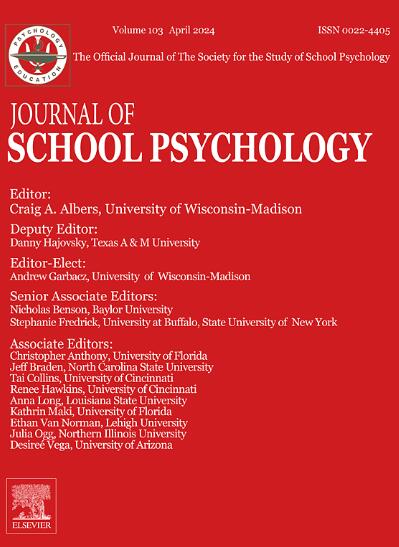一个复杂的动态系统的观点对文化,背景和身份在心理教育干预中的作用
IF 4.1
1区 心理学
Q1 PSYCHOLOGY, SOCIAL
引用次数: 0
摘要
在本文中,我们应用复杂动态系统(CDS)的观点来重新考虑当前关于教育背景的因果假设以及文化、背景和身份在心理教育干预中的作用。关注诸如教师和学生的参与、动机、发展和幸福等现象,我们强调干预的概念分析单元是“他们真实生活环境中的代理人”。与设计和评估干预措施(如随机对照试验)的流行方法中关于因果关系的假设不同,CDS视角通过将因果过程视为紧急的、非确定性的、由于因素的相互依赖性、转移稳定性和上下文嵌入性而变化的,从而提供了与环境和治疗相关的异质性和动态性的解释。我们描述了一个基于文化和情境的身份、动机和行动的角色认同动态系统模型(DSMRI),以说明角色认同动态系统模型在心理教育干预中的应用。我们举例说明了这一观点对设计和评估心理教育干预的影响,作为基于设计的案例研究,以“情境中的行动者”的分析单元为基础进行分析。本文章由计算机程序翻译,如有差异,请以英文原文为准。
A complex dynamic systems perspective on the roles of culture, context, and identity in psychoeducational interventions
In this paper, we apply a Complex Dynamic Systems (CDS) perspective to reconsider current causal assumptions about educational contexts and the roles of culture, context, and identity in psychoeducational interventions. Focusing on phenomena such as teachers' and students' engagement, motivation, development, and wellbeing, we emphasize the phenomenon's conceptual unit-of-analysis for interventions as “the agent(s) in their authentic lived environment.” Different from assumptions about causality in prevalent approaches to designing and evaluating interventions (e.g., RCT) as cross-contextual, independent, and mostly linear, a CDS perspective affords accounting for contextual and treatment-related heterogeneity and dynamism by viewing causal processes as emergent, non-deterministic, and changing due to factors' inter-dependence, shifting stability, and contextual embeddedness. We describe a CDS model of culturally and contextually based identity, motivation, and action—the Dynamic Systems Model of Role Identity (DSMRI)—to illustrate the application of CDS to psychoeducational interventions. We exemplify this perspective's implications for designing and evaluating psychoeducational interventions as design-based case studies that ground analyses at the unit-of-analysis of the “agent(s)-in-context.”
求助全文
通过发布文献求助,成功后即可免费获取论文全文。
去求助
来源期刊

Journal of School Psychology
PSYCHOLOGY, EDUCATIONAL-
CiteScore
6.70
自引率
8.00%
发文量
71
期刊介绍:
The Journal of School Psychology publishes original empirical articles and critical reviews of the literature on research and practices relevant to psychological and behavioral processes in school settings. JSP presents research on intervention mechanisms and approaches; schooling effects on the development of social, cognitive, mental-health, and achievement-related outcomes; assessment; and consultation. Submissions from a variety of disciplines are encouraged. All manuscripts are read by the Editor and one or more editorial consultants with the intent of providing appropriate and constructive written reviews.
 求助内容:
求助内容: 应助结果提醒方式:
应助结果提醒方式:


